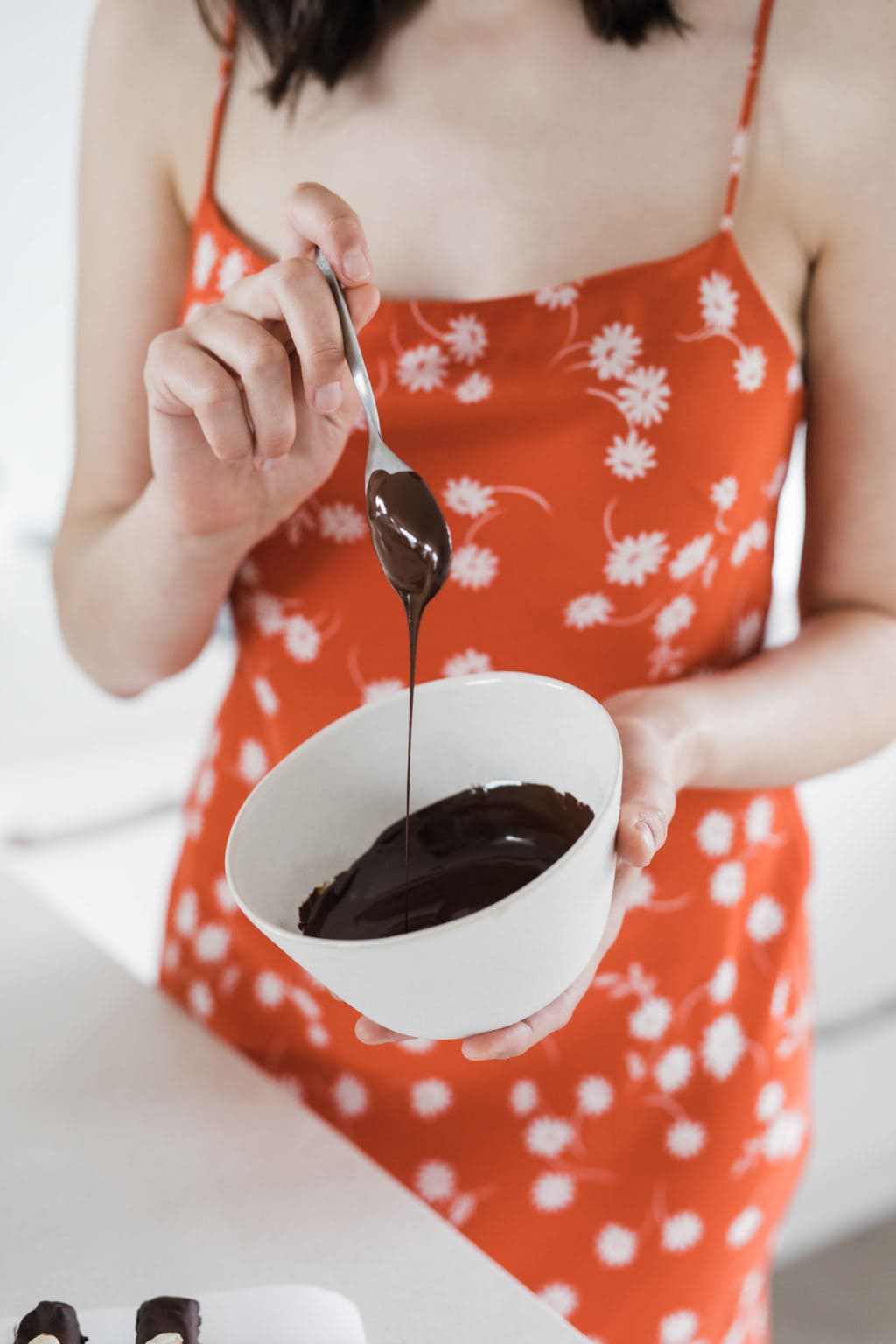The holiday season is a time synonymous with foods that evoke comfort, nostalgia and pleasure. But, for many, it can also be a time for heightened body preoccupation and food guilt. Read on for tips around why we shouldn't feel bad for indulging over the festive period.

The Christmas and New Year holidays are looming, and ’tis the season to be jolly, gobble up fruit mince pies, and play “All I Want for Christmas is You” on a repeat loop because, well, it’s socially acceptable.
Calendars start to fill with end-of-year celebrations at December’s commencement, often centred around delicious food and bubbles galore. Toss in impending work deadlines, a rush to get Xmas shopping done and presents wrapped, and it’s all-too-easy to shrug the shoulders and loosen the dietary reigns because ‘meh’ it’s Christmas – a time to eat, drink and be merry!
Feeling Good vs Feeling Guilt
Enjoying the silly season and its glorious fare is part-and-parcel with this special time of year. But for some, this can also bring a hefty dose of food preoccupation.
This might manifest as food shaming, a narrative that sounds like “why did I eat so much?”, or “I shouldn’t have eaten that, where’s my self control?!”, and even unwanted comments from others “but, that’s your second helping of dessert?!” (and, so what?).
It might be adopting an all-or-nothing mentality approach to eating or drinking – go hard, or go home because it’s Christmas – leaving us feeling a bit worse for wear.
Or it might be subscribing to the notion that in January, we’re going on a diet. Come the festive season the diet culture industry likes to turn the volume up to a max with a tsunami of articles and conversations around the latest weight-loss trends and hottest exercise regimes – leaving us questioning ourselves, habits and bodies.
The Role of Diet Culture
Diet culture poses many challenges to our relationship with food. It suggests that self-worth is tied to physical appearance or numbers on the scale. It tells us certain foods are ‘good’, others ‘bad’, so we’re good or bad depending on what we eat. It disconnects us from our body and intuitive hunger, letting our mind become the (often shitty) commander of our appetite. It also provides a position of judgement around ours – and others – food choice, whether consciously or not.
All of this can be so stressful, and often kicked up a notch over the festive season.
Food for Thought
The process of unlearning food rules and diet culture isn’t always easy, especially if we’ve ingrained habits or ideologies. But, we must challenge this way of thinking. Here are perspectives for navigating food guilt over the holiday season:
1. Tune into Hunger Cues
Our hunger cues help let us know we’re hungry, satisfied or full. When we let our mind rule the roost and dictate food choice, it can become difficult to tune in. This can contribute to food restriction, overeating or food guilt.
To gently start shaking this way of thinking, begin approaching food choice more intuitively. Over the holiday season do a quick body check-in – here and there – before, during and after eating. What signs is your body giving you that you might be getting full? Are you loosing interest in what’s in front of you? Is eating becoming more mechanical?
Tuning in can require a bit of practice, particular if we’re not used to it. If you’re struggling try ranking your appetite on a scale of one to ten – one being ravenous, ten being so full you need a post-eating siesta!
2. Focus on the Experience of Eating
Mindful eating is about focusing on food in front of us and getting immersed in the sensory experience of eating. This means taking time to really look at our meal, smell its aroma, feel the texture in our mouth and relish in its taste.
Eating in a state of presence often magnifies the deliciousness of a meal – and so we’re left more satisfied too!
Take time to explore the five senses when eating a meal – how does it look, smell, taste, feel and sound like as you eat? Does the first bite taste different to the middle to the end?
The intention of mindfulness can also be used to connect with those around us when eating. If food worries enter the mind, focus on tuning back to what loved ones are saying, the expressions on their faces and feel of the room. What joy is in this moment?

3. Keep Routine Where You Can
The holiday season brings variability to our social calendars, shopping trolleys and usual dietary habits.
We might manually override hunger cues, thinking we’ll skip a meal to ‘save’ our appetite or calories for the main event. But, this can kick our appetite into overdrive, where we’re more likely to eat beyond a sense of comfortable fullness.
Don’t overthink or try adjust how you usually eat to accommodate the holiday season. Instead, keep what dietary routines you can, where you can – this will keep you more steady, fuelled, calm and in control of appetite.
To encourage reliable hunger and fullness cues, eat regularly across the day and avoid skipping meals.
4. Your Plate is Your Business
We’ve likely all been at a get together where someone has made a comment about another’s meal. While this can be uncomfortable for everyone, if you’re in the firing line it hits a little different.
Experiencing judgement from another can lead to feelings of shame or guilt. While that person might be intending to come from a place of love or care, your plate is your business. You’re allowed to have seconds (or thirds!). You’re allowed to enjoy it. You can reject a drink.
If someone says something that feels disruptive or judgemental, consider – and if you’re comfortable doing so – calmly challenging or deflecting their statement. Let’s lead the way of championing the idea that hey, this kind of talk isn’t okay.
Here are some ideas: “Thanks for offering me more, but I’m feeling satisfied”, “I’m happy with how my plate looks, thanks – so tasty!”, “Do you know that carbs are actually the bodies preferred source of energy? And they’re so delicious too!”, “I’ve been working really hard on showing myself self-love, and don’t feel comfortable when you make those comments about me”.
5. Explore What Feels Good
For some, the holiday period can be a great time to top up our self-care tank. We may have work commitments stripped back, we’re holidaying somewhere bliss or maybe we just get to lay low at home (ahh, my introverted bliss).
Food aside, see if you can take some time to see what feels good over the festive break – mentally, physically, emotionally, spirituality, whatever.
Here, tune into how you feel – do you find an activity leaves you calmer, relaxed, happier, thrilled or more balanced? Can you do more of it over the break?
Self-care looks a little different to everyone. Maybe it’s taking an afternoon nap, a self-massage before sleep, listening to tunes, or spending way too much time cleaning your car. You do you.

6. Rethink New Year Resolutions
When it comes to setting NY goals, often much emphasis is on what we want to look like, rather than how we feel.
For some, setting resolutions that focus on this pulls us away from the bigger picture of health. When adopting healthier habits, there might not always be a shift on the scales, but this doesn’t mean that positive changes to our wellbeing aren’t happening.
Instead of aspiring to try a new diet that unnecessarily restricts, how might we examine and rethink our relationship with food to show ourselves more self-love? Do we hold any limiting beliefs that we could challenge?
To Wrap Up…
From time in Nutrition Practice I can assure that if you’ve read this article and it resonates deeply, a lot of others struggle here too. You’re not alone on this journey.
Remember – our health is built on consistency. It’s what we do most of the time that matters. Not all of the time and not some of the time. If you indulge in tasty Christmas treats you haven’t fallen off a bandwagon or failed at anything – you’ve just enjoyed some delicious food! Have a safe and happy holiday period🤍


No Comments